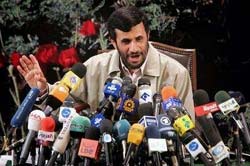
Iranian President Mahmoud Ahmadinejad speaks at a news conference in
Tehran Jan. 14. (Reuters)
Iran said on Saturday that it will never give in under pressure to halt its
recently resumed nuclear research work even if its nuclear file was referred to
the UN Security Council, but called for more talks to solve the current
standoff.
"Our position is very clear: we are carrying out nuclear activities according
to the Non-Proliferation Treaty (NPT) and the International Atomic Energy
Agency's (IAEA) regulations. Asking us to stop nuclear research is beyond such
conventions," Iranian President Mahmoud Ahmadinejad told reporters at a press
conference earlier in the day.
"Nuclear research is our natural right and we had suspended it voluntarily.
Now, we will resume them," Ahmadinejad added.
Iran on Tuesday removed seals on research facilities at three nuclear sites
and resumed nuclear fuel research work suspended for more than two years under
the supervision of the IAEA, incurring condemnation of the European Union, the
United States and some other countries.
Meanwhile, Iran has also rejected a proposal of Russia to establish joint
uranium enrichment venture on Russian soil.
In response, the EU trio of Britain, France and Germany on Thursday said that
the nuclear talks with Iran had been at a dead-end, calling for an emergency
session of the IAEA to vote on referring Iran's nuclear case to the UN Security
Council, which could lead to sanctions on the Islamic Republic.
The United States has repeatedly expressed support to the EU call of referral
but ruled out military actions on Iran.
Meanwhile, Ahmadinejad slammed the EU's call as "forcing the IAEA to adopt
political resolutions on Iran", vowing that Iran "would not be bullied" even at
the UN Security Council.
"The IAEA should be an undoubtedly authoritative international body dealing
with nuclear issues, but what they (the EU and the U.S.) are doing will damage
the credit of the IAEA," he stressed.
However, the hardline president did not recall a threat of stopping
cooperation with the international community made by the country's Foreign
Minister Manuchehr Mottaki on Friday.
"If the case dossier is referred to the Security Council, the European
countries will lose the current means (to solve the Iranian nuclear issue). The
government must cease all voluntary measures of cooperation according to the
law," Mottaki told the official IRNA news agency.
The Iranian Majlis (Parliament) last November approved a law which requires
the government to cease all voluntary confidence-building measures if the
country's nuclear case were taken to the Security Council.
Tehran defines the suspension of uranium enrichment and the implementation of
the additional protocol of the NPT, which allows UN inspectors to carry out snap
inspections, as voluntary measures to build confidence.
Later on Saturday, the Iranian Foreign Ministry issued a statement, saying
that the EU "has no right to expect Iran not to go ahead with research work on
utilizing nuclear energy for civilian purposes."
"It is surprising that the European states have embarked on an illogical
drive against (Iran's) resumption of research studies. It is surprising that
they interpret their illogical approach toward the Iranian nuclear program in a
way that they are right to fabricate new charges everyday," according to the
statement, cited by IRNA.
However, the statement also called for the EU to continue negotiations to
solve the disputed nuclear issue.
"Iran believes that the standoff with the EU about the nuclear program should
be settled by negotiations and advises the European partners to be rational in
dealing with Iran and Iran's rights," it added.
Tehran and the EU were previously scheduled to hold another round of talks on
Jan. 18, but the EU had said that Iran's restart of nuclear research would
endanger the negotiations.
Hossein Entezami, spokesman of Iran's Supreme National Security Council, was
quoted by IRNA as saying on early Saturday that the bilateral nuclear talks
would not touch on the Islamic Republic's nuclear research.
"Nuclear research is a totally independent subject and Iran has already
informed the IAEA and Europe regarding this matter. Iran and the EU will just
discuss the issue of uranium enrichment," Entezami said.
"Russia's proposal, the continuation of talks with Europe and cooperation
with the IAEA were three entirely separate issues," the spokesman added.



